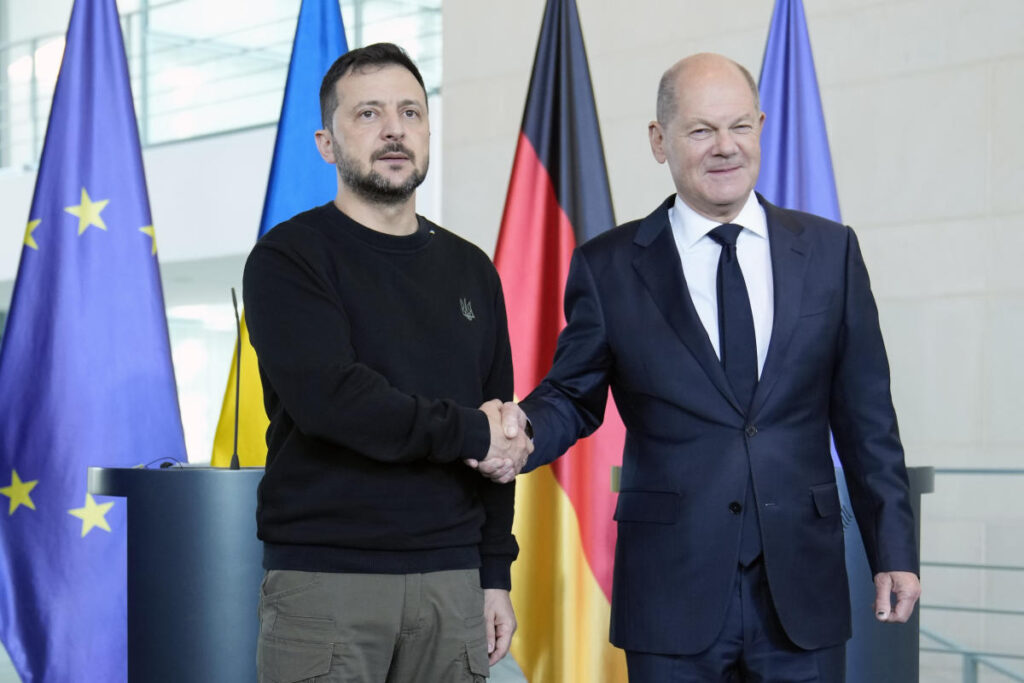President Volodymyr Zelenskyy emphasized the critical need for sustained military support from Ukraine’s allies as he visited Germany to secure a new weapons package from Chancellor Olaf Scholz. This visit is part of a broader European tour that included stops in London, Paris, and Rome, intended to bolster backing for Zelenskyy’s “victory plan” aimed at bringing an end to the ongoing war with Russia. Despite the setback of a planned summit with U.S. President Joe Biden and other allied leaders, which was canceled due to Hurricane Milton, Zelenskyy remains focused on strengthening international support for Ukraine.
During his meeting with Scholz, the German Chancellor reaffirmed Germany’s commitment to being Ukraine’s largest military supporter in Europe, second only to the United States. He announced a new military support package valued at approximately 1.4 billion euros ($1.5 billion) to be delivered by the end of the year. This package includes critical military equipment, such as air defense systems, Gepard anti-aircraft guns, armored vehicles, combat drones, and artillery ammunition, reflecting Berlin’s ongoing emphasis on enhancing Ukraine’s air defense capabilities. In response, Zelenskyy stressed the importance of maintaining aid levels, particularly as budget forecasts indicate a decline in military support for the following year.
Germany’s defense budget has allocated nearly 7.5 billion euros in military aid for Ukraine this year, while next year’s aid is projected at 4 billion euros. To compensate for this reduction, Germany aims to rely on a proposed $50 billion international loan package funded by revenues from frozen Russian assets, which could help finance Ukraine’s procurement of military supplies directly. Scholz assured Zelenskyy of Germany’s continued support, highlighting the need for Russia to understand that prolonging the conflict will not result in diminishing aid to Ukraine.
Zelenskyy’s efforts appear strategically timed, as he aims to secure European support amidst the uncertainties surrounding the upcoming U.S. elections, particularly with the political dynamics involving former President Donald Trump, who has been critical of U.S. aid to Kyiv. The Ukrainian military faces significant pressure on the eastern front, especially in the Donetsk region, where Russian forces have made advances. In light of the ongoing struggles, Zelenskyy reiterated the urgency of building alliances to strengthen Ukraine’s defensive position and to expedite an end to the conflict, with the aspiration of achieving peace by 2025.
In addition to his meetings with European leaders, Zelenskyy also had an audience with Pope Francis at the Vatican, where they discussed the humanitarian situation in Ukraine amid the war. The Pope has been vocal about the need for peace and has previously faced scrutiny for suggesting that Ukraine should negotiate with Russia, which some interpreted as a call for surrender. Nonetheless, he has advocated for diplomatic solutions and emphasized the significance of prisoner exchanges as part of the peace process.
Zelenskyy’s diplomatic engagements underscore Ukraine’s commitment to securing support for its military needs and its long-term strategy to establish a peaceful resolution to the conflict. As he navigates the complex landscape of international relations and pressing military challenges, Zelenskyy’s call for unwavering support from allies signifies the ongoing struggle for Ukraine’s sovereignty and stability in the face of aggression from Russia.

